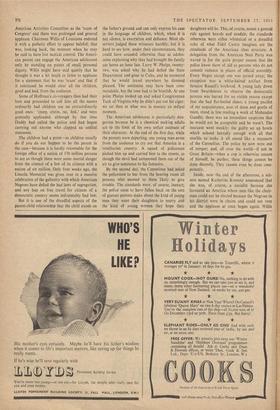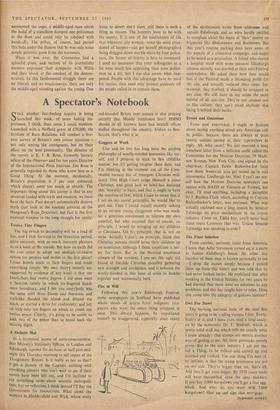The American Family
From MURRAY KEMPTON
WASH INGTON
AMERICANS must be the first people to have /111, raised a generation of children equipped to assassinate their parents. Our young, painful though they are, may be our most dangerous weapon in a time when the Soviets have lost control of the revolution and we have lost control of the counter-revolution. The American adoles- cent is a plague germ infecting every cubic foot of air where there is a juke-box and a child susceptible to self-pity.
The metropolitan police of Washington have just spent a couple of days picking up the van- guard of the Fifth International and bumping them down the steps of the House of Repre- sentatives office building. Washington thought these scenes riotous, which was an exaggeration. They were, however, not without importance as a ritual playing-out of the parent-child relation- ship in its most common American form, with the House Committee on Un-American Activities as Daddy and the youth section of the Progres- sive Labour Movement, a Leninist splinter, as Junior and Fidel Castro, of course, as the delinquent with whom Junior has been caught playing. The House Committee had summoned a group of sixty American students, just back from two months in Castro's Cuba in defiance of the State Department's regulation.
The Un-American Activities Committee opened with an exhibit of the Good Boy. Barry Hoff- man, a Massachusetts real-estate junior execu- tive, had made the trip to Cuba as a volunteer agent for the FBI and the CIA. He worked from the plane of unction and outrage to which these services entitle any good American, but his recollections were deficient of mad music and strong wine. Beside them a baldly factual descrip- tion of an ordinary college house party in the United States would sound like something com- posed by Louis-Ferdinand Celine. Hoffman re- membered only one direct confrontation with the face of the enemy; the students were at the beach and Fidel Castro challenged one of them to a game of ping-pong. Castro kept score. The game was close. The maximum leader took off his hat and his shirt and removed his combat boots and pressed on, remorselessly aggressive, and won the game.
`He wanted to play again. I believe it was two and a half to three hours. Four or five students played him; and they wanted to go on, but he said, "l'm sorry I can't. I've got to get back to the affairs of State." I believe that was some indication of how his mind works.'
That was the sum of the Good Boy's intelli- gence information, and it was depressing to think how far the Fifth International will force the CIA to fill its files with material which sounds like one of those theses composed for a doc- torate in education under some title like: The Peer Group Interrelates or Getting. the Most from the Free Play Period.
Haffman's audience was young and generally hostile; at one point he recalled that one of the student leaders had described the House Un- American Activities Committee as the 'scum of Congress' and there was prolonged and general applause. Chairman Willis of Louisiana endured it with a pathetic effort to appear baleful; that was, looking back, the moment when he may be said to have lost tactical control. The Ameri- can parent can engage the American adolescent only by standing on points of small personal dignity. Willis might have said quietly that he thought it was a bit much to listen to applause for a statement that he was 'scum' and that if it continued he would clear all the children, good and bad, from the audience.
Some of Hoffman's co-voyagers then had their turn and proceeded to call him all the names ordinarily bad children use on extraordinarily good ones: 'creep, cretin, rat, fink,' and were generally applauded, although by that time Daddy had called the police and had begun carrying out anyone who clapped an unfilial statement.
The children had a point—as children usually do if you do not happen to be the parent in the case—because it is hardly reasonable for the foreign office of a nation of 170 million persons to act as though there were some mortal danger from the contact of a few of its citizens with a nation of six million. Only four weeks ago, the Lincoln Memorial was given over to a massive celebration of the gallantry with which American Negroes have defied the bad laws of segregation, and any ban on free travel for citizens of a democratic country seems indisputably bad law.
But it is one of the dreadful aspects of the parent-child relationship that the child stands on the father's ground and can only express his case in the language of children, which, when it is not silence, is execration and defiance. Most ob- servers judged these witnesses harshly; but it is hard to see how, under their circumstances, they could have sounded otherwise than as adoles- cents explaining why they had brought the family car home an hour late. Larry W. Phelps, twenty- two, was asked why he had defied the State Department and gone to Cuba, and he answered that he would travel anywhere he damned pleased. The sentiment may have been com- mendable, but the tone had to be brattish. At one point Phelps looked up and asked Congressman Tuck of Virginia why he didn't put out his cigar; we sat then at what was in essence an oedipal moment.
The American adolescent is particularly dan- gerous because he is a chemical making adults act to the limit of his own unfair estimate of their character. At the end of the first day, while the parents were departing, one young man arose from the audience to cry out that America is a totalitarian country. A squad of policemen picked him up and carried him to the streets, as though the devil had summoned them out of the air to give substance to his fantasies.
By the second day, the Committee had asked the policemen to bar from the hearing room all persons who seemed to them likely to give trouble. The standards were, of course, inexact; the police seem to have fallen back on the sort of guesses parents make about the kind of young man they want their daughters to marry and the kind of young women they hope their daughters will be. This, of course, meant a general rule against beards and sandals; the standards otherwise were either whimsical or a dreadful echo of what Fidel Castro imagines are the standards of the American class structure. A delegation from the American Nazi Party was waved in for the quite proper reason that the police know them of old as persons who do not commit violence in places of official assembly. Every Negro except one was turned away; the exception was a white-haired artifact from Senator Russell's boyhood. A young lady down from Swarthmore to observe the democratic process was barred for no visible reason except that she had flat-heeled shoes; a young pacifist of my acquaintance, neat of dress and gentle of mien, stood in line reading a work of Mohandas Gandhi; there was an immediate suspicion that he would not be acceptable and he wasn't. The innocent went meekly; the guilty set up howls which echoed horridly enough with all that marble- to make it all sound like a massacre of the Carmelites. The police by now were out of temper; and, all over the world—if not in Great Britain—when a cop is otherwise unsure of himself, he pushes; these things cannot be done decently. They cannot even be done com- petently.
Inside, near the end of the afternoon, a wit- ness named Katherine Krensxy announced that she was, of course, a socialist because she favoured an America where men like the chair- man could not be elected because the Negroes in his district were in chains and could not vote and the applause at once began again. Willis summoned the cops; a middle-aged man about the build of a stanchion dumped one policeman to the floor and could only be subdued with handcuffs. The police, of course, had passed this bolo under the illusion that he was only some simple patriotic goon from the teamsters.
When it was over, the Committee had a splendid press, and various of its journalistic enemies expressed their sympathy with Willis and their shock at the conduct of the demon- strators. In this fundamental struggle there are no liberals and no reactionaries; there are only the middle-aged standing against the young. One hates to desert one's class; still there is such a thing as reason. The honours have to be with the enemy. It is one of the misfortunes of life that whenever any woman—even the most aban- doned of harpies—can get herself photographed being dragged down marble stairs by four police- men, the favour of history is hers to command. I need no assurance that your suffragettes as a lot were much less appetising than your police- men as a lot; but I am also aware what hap- pened. People with this advantage have no need for tactics; they need only bounce aimlessly off the people called in to contain them.




































 Previous page
Previous page